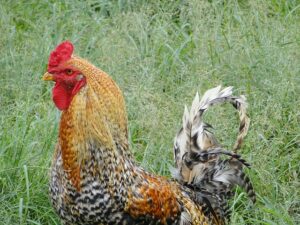Owning chickens comes with a lot of reward—fresh eggs every morning, a sustainable way to recycle food scraps, and, let’s face it, chickens are downright hilarious to watch when they’re scratching around. But nothing ruins the joy of backyard chicken keeping faster than a chicken diseases leaving you with a sick bird.
Maintaining a healthy flock is a little like running a tiny farm hospital; it requires vigilance, a sprinkle of know-how, and a whole lot of love. Whether you’re managing a bustling poultry operation or just tending a cozy backyard coop, knowing the essentials of chicken disease prevention is a must. Let’s dig in!
Common Chicken Diseases and How to Prevent Them
Respiratory Diseases
Sneezing chickens? Watery eyes? You might have a respiratory problem in your flock. Chickens aren’t exactly holding miniature tissues over their noses, but they can catch colds of their own—sort of.
- Infectious Bronchitis (IB): Fast-spreading and frustrating. Keep your coop ventilated and avoid overcrowding to reduce the spread.
- Mycoplasma (MG): This sneaky disease can linger for a long time. Quarantine new chickens before introducing them to your established flock.
- Avian Influenza (AI): The dreaded bird flu. Aside from biosecurity measures (which we’ll touch on later), avoid contact between your flock and wild birds.
Prevention Tip: Respiratory diseases love cramped, damp coops. Keep spaces clean, check for drafts, and ensure plenty of fresh air. Your chickens will thank you by not coughing at the dinner table.
Digestive Tract Diseases
“Oh no, we’ve got a poopy butt situation!” Digestive illnesses are messy, unpleasant, and dangerous if left untreated.
- Coccidiosis: A common parasite in chickens. Keep bedding dry and clean, and consider adding probiotics to their diet.
- Marek’s Disease: A real troublemaker, especially for young birds. Vaccination is key here—it’s like giving your chicks a little health insurance.
- Gut Health Management: Apple cider vinegar in water, anyone? Yes, it’s as old-school as grandma’s remedies, but it really can help promote digestive health.
Viral Diseases
Viral diseases can be a nightmare, but with the right strategies, you can keep your flock safe.
- Newcastle Disease and Infectious Bursal Disease require strict transmission prevention.
- Biosecurity 101 = clean boots, clean hands, and a “no petting strange chickens at your neighbor’s house” policy.
Bacterial Infections
Ever heard of Salmonella? We’re looking at you, egg handlers. Even chickens can harbor bacterial infections that can spread to humans.
- Keep feed areas clean.
- Regularly sanitize waterers and nesting areas to give bacteria the boot.
- Treat infections promptly with guidance from a vet.
Pro Tip: Prevention is way easier (and cheaper) than treatment!
Basic Veterinary Care and First Aid
Sometimes, despite all your efforts, accidents or illnesses happen. Here’s how to be prepared.
What Should Be in Your Chicken First Aid Kit?
- Bandages and wound-cleaning supplies
- Probiotic powder (they need gut support!)
- Vitamins and electrolytes for stress relief
- A chicken-appropriate antiseptic (because accidents in the coop happen ALL the time!)
Common Chicken Injuries
You’re part detective, part nurse when it comes to injury care.
- Cut or Broken Beaks? Gently clean, and keep them on soft food for a while.
- Leg Injuries? Watch for limping. Have splinting supplies ready for fractures.
Parasite Control and Prevention
Chickens scratching at themselves non-stop? Mites, lice, and worms may have moved in like unwanted houseguests.
- External Parasites like mites and lice can be tackled with dusting powders, and regular coop clean-outs (new bedding is like pressing refresh!).
- Internal Parasites require dewormers, either natural or chemical options.
Prevention is key: Keep coops dry, clean, and pest-free. Treat all chickens at the same time—no one gets left behind!
Vaccination Schedules and Why They’re Important
Chickens don’t come out of the egg with built-in super immunity, folks. Vaccinating your flock is crucial to staying ahead of many preventable diseases.
- Core Vaccines for Marek’s Disease and Newcastle Disease should be part of every breeder’s toolkit.
- Timing Matters! Chicks often get their first vaccinations within hours of hatching. Adult flocks may need boosters.
Pro-Tip: Your local agricultural office can provide vaccination guidelines specific to your area. Different flocks have different needs!
It’s All About the Big Picture
Keeping chickens healthy starts with a clean, safe environment, a solid prevention plan, and just a pinch of paranoia (you’ll know when it looks “off”). A sick chicken here and there is inevitable, but a proactive approach can help keep your flock happy and clucking well into their golden years.
Have questions or tips of your own? Drop them in the comments below! Together, we can make chicken keeping as rewarding (and drama-free) as possible.
Happy chicken keeping! 🐔

